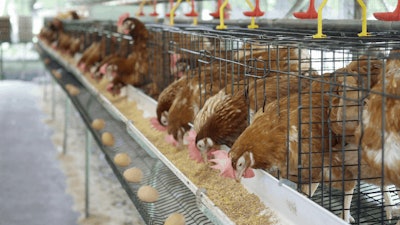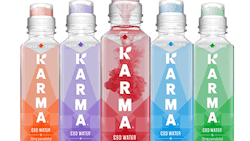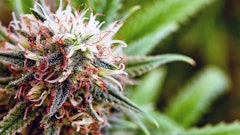
The Association of American Feed Control (AAFCO) has released an updated position paper and call to action urging the hemp industry to conduct more research on the use of hemp and its byproducts in animal food.
The U.S. Food and Drug Administration Center for Veterinary Medicine (FDA-CVM) has not yet approved the use of hemp feed ingredients in animal feed at the federal level. However, "hemp food products like oil, protein and hearts have generally been recognized as safe (GRAS) product notices submitted with no concern from FDA," Hemp Grower previously reported.
AAFCO is an independent organization that aims to help gain approval for different parts of hemp to be added to animal feed.
In a recent press release, the AAFCO stated that it is unknown whether it is safe to use hemp products as feed for all animal species and has requested for the industry to conduct more research to "address the levels of THC in hemp and what affects the content will have on the intended uses and species."
The organization also stated in the release that it is "concerned that bringing hemp products to market through a state-by-state patchwork of laws, without the backing of in-depth research and a formal review process, will lead to inconsistent manufacturing methods, unsupported marketing claims across the country, and restriction of interstate and international markets."
So, the AAFCO is encouraging industry members, lawmakers and agricultural leaders to complete the "necessary research and legal approval process that will demonstrate the safety and efficacy of this ingredient." The organization wants researchers to consider these potential adverse side effects and impacts of using hemp as animal feed:
- the health and safety of livestock pets;
- the safety of food from food-producing animals;
- farmers, ranchers and feed manufacture risking and violating federal laws; and
- ranching and dairy access to interstate commerce, international markets, and market access.
"We understand the hemp industry is eager to enter the animal food market, but we are concerned that not enough research has been completed on these products," said Susan M. Hays, AAFCO executive director, in the press release. "That's why we are urging the hemp industry to conduct appropriate research and submit their results to us for review as a normal step in our ingredient approval process."
"Allowing hemp byproducts to be used for animal nutrition before rigorous research and legal approval processes have been completed could have adverse impacts on ranchers' access to markets, on animal health, and ultimately on human health when hemp-fed animal products enter the human food chain," Hays added.
Roadblocks in Approval
One organization fighting for the use of hemp as an ingredient in animal food is the Hemp Feed Coalition (HFC), which submitted an application last year to include hempseed cake and meal in chicken feed.
RELATED: Hemp Feed Coalition Submits First Application to FDA for Hemp as Animal Feed Ingredient
According to AAFCO's press release, HFC's application is still under review as of September 2021. Hunter Buffington, HFC executive director, tells Hemp Grower that the organization is expected to have a call this month with the FDA-CVM to discuss the application.
In the last six weeks or so, Buffington says a lot has happened in the industry that directly affects HFC's application.
"…[A]s you know, the FDA denied Charlotte Web's application [requesting approval of its full-spectrum hemp extract] because of an approval for Epidiolex, and we are also experiencing that in our FDA-CVM response to our laying hemp application," Buffington tells Hemp Grower
RELATED: FDA Balks at CBD Dietary Supplement Application, Maintaining Regulatory Uncertainty
While hempseed itself does not contain cannabinoids, the FDA has stated that hemp ingredients it has approved may contain “trace amounts of THC and CBD, which the seeds may pick up during harvesting and processing when they are in contact with other parts of the plant.”
"AAFCO is aware that this concern over considering a nutritional or a supplement application for hemp is in jeopardy because of Epidiolex," Buffington adds.
She explains that the HFC is trying to meet safety and efficacy concerns; however, the organization cannot add other ingredients or move forward with additional applications like AAFCO requested in its position paper until the Epidiolex issue is dealt with.
"If they're going to block every food and feed application because of Epidiolex, what are we supposed to do?" she says.
Buffington says she is hearing concerns from regulators across the country regarding consumer and animal safety.
"What I hear from regulators is that this unregulated product environment allows shelves to be filled with cannabis products and hemp feed products. [These products] are in grocery stores and convenience stores; they're on kitchen counters; they're in barns, and no one is able to regulate them because FDA and AAFCO would not move forward with any regulatory oversight. So, the primary concern that I hear from regulators is that they are being told that they cannot regulate these products until the FDA makes a decision," she says.
Another concern is that there is not enough funding within the hemp industry to support all the research that is being requested, she says. Not only is the research expensive, but it must be conducted in the U.S. and use hemp that has been grown and processed in the U.S.
"[Another thing] is that the FDA-CVM requested an additional data set that showed homogeneity of American-grown and American-processed ingredients," she says. "And we did this for meal and cake, and it took us two years to gather enough certificates of analysis from across the United States, and these were shared with us from farmers and processors, very much driven by American hemp farmers."
"It took two years, and that cost to a farmer, if they were to do the entire nutritional cannabinoid and contaminant panels that we need for each of those ingredients, it's a couple of thousand dollars," Buffington adds. "And we have to do that 40 times. The typical application in a feed additive petition and a new ingredient definition is five to seven certificates of analysis on nutrition and contaminate composition. So, we still have to present five to seven nonconsecutive lot numbers, and then the additional data set has been requested."
The hemp industry cannot be expected to do this alone, she says.
RELATED: Hemp Feed Coalition Makes Inroads on Including Hempseed in Chicken Feed
The HFC is still very much focused on its first application but plans to focus on hempseed oil next, she says. The organization is currently working on the analytical analysis for the ingredient itself.
"We have a principal investigator at North Carolina State University who has done the study, protocols and process and procedures, and we're ready to pull the trigger on an equine oil study, and it's $130,000," she says. "We need a champion, and then we can move that project forward. It would start an oil application for horses, which is the largest market in the United States. And I think that is a good snapshot of where we are right now, in a barrier that we can't overcome, and the $130,000 is not the millions of dollars that it's going to take."
The Need for Change
Buffington says she thinks some things need to change for the hemp industry to be able to fulfill AAFCO's requests.
First, the dual designation of hemp as an agricultural crop and a horticultural specialty crop needs to be clarified, she says.
"We should be treating hemp grain as an agricultural commodity and a food and feed source," Buffington says. "And the FDA even acknowledged themselves that hemp grain has very minor cannabinoids and not enough to make people high. ... And then to turn around and say that because of CBD concentrations in a drug application, that they can't consider nutritional designation for these products is directly contradictory to why we moved forward legalizing hemp as an agricultural commodity in the 2014 Farm Bill."
"We know to look for contaminants; we know how to prevent people from getting sick from the food that they eat. And if cannabinoids are found in small concentrations in the hemp seed, as acknowledged by FDA, then there is no reason to prevent us being able to regulate these food and feed sources in that manner and ensure consumer and animal safety," she says.


























